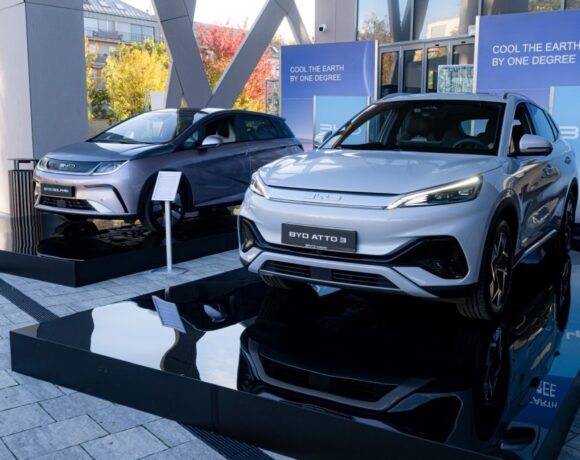Tile of Spain squares up for mega push into MENA territory
Image: Alberto Echavarría, Secretary-General of ASCER, sees the MENA region playing a key role for Tile of Spain in the 2022-2030 period. Credit: Arnold Pinto
The Spanish ceramic tile industry is banking on aesthetic and technical innovation, exceptional quality, and enhanced sustainability to substantially ramp up its market share in the ultra-competitive Middle East and North Africa (MENA) market.
Operating in 180+ countries across the globe under the reputed Tile of Spain brand, the 137 ceramic tile manufacturers affiliated to ASCER (Spanish Ceramic Tile Manufacturers’ Association) supply their exclusive wall and floor tiles to varied customer segments across the MENA region, including the six oil- and natural gas-producing GCC members: Saudi Arabia, UAE, Qatar, Bahrain, Kuwait, and Oman; Israel, Egypt, Iraq, Iran, Jordan, Lebanon, Turkey, Syria, Yemen, and the Palestine territories.

Renowned worldwide for an inspiring blend of aesthetics, functionality and technical innovation, Spanish ceramic tiles draw on a rich heritage of skill and creativity, while remaining at the cutting edge of design. Manufactured in Spain, the products are beautiful, meaningful and high-performance solutions to flooring, wall coverings, furnishing and external paving and cladding.
Global market growth
The global ceramic tiles (porcelain, glazed, unglazed) market is expected to grow at a CAGR of 6.5% from 2022 to 2029, and is projected to surpass US$366.08 billion by 2029 from US$207.7 billion in 2021.

With the GCC ceramic tiles market valued at US$7.8 billion in 2020, and expected to grow at a CAGR of 7.9% by 2028, largely due to the sheer and constantly rising number of construction projects in the region Tile of Spain is perfectly poised to meet the region’s ever-growing demand according to Alberto Echavarría, Secretary-General of ASCER.
In an exclusive interview with MENews247 on the sidelines of the 20th Tile of Spain Awards prize-giving ceremony held on June 14, 2022, in València, Spain, Echavarría said: “Since 1977, Spanish ceramic tile manufacturers under the umbrella of ASCER, have proven that they are trend-setters in all aspects of innovation, product quality, and sustainability, and it is these three key factors that our members – through the Tile of Spain trademark – will emphasise on and drive home in the key MENA ceramic tiles market.”

Top 2 regional markets
With Saudi Arabia consistently being among Tile of Spain’s Top 10 international export markets, Echavarría stressed that the Middle East as a whole, has “been very important historically” to the Spanish ceramic tiles industry, especially the “top two markets of Saudi Arabia and the UAE” respectively.
The MENA region enjoys strong ties with Spanish ceramic tiles, said Echavarría, collaborations that go beyond aesthetics, with the region’s commercial and non-commercial end-users increasingly singling out Spanish products over those from the other leading global ceramic tile manufacturing countries led by China, India, Turkey and Brazil, in that order.

Providing an overview of the key challenges facing Tile of Spain in the MENA region for 2022-2030, Echavarría noted the main challenge stems from “very well-known ceramic tile producers” in the region who, because they are not overly burdened by fast-rising energy costs, stringent carbon offset regulations, and receive government backing, are “able to bring more competitively priced products to international markets, as compared to Spanish manufacturers”.

Given the digital and other means with which it is comparatively easy to illegally copy Spanish proprietary designs, reproduce and then sell lookalike Spanish ceramic tiles on the global markets, Echavarría noted that as “it is very difficult and cumbersome to protect Intellectual property rights” in context of ASCER members, the Spanish ceramic tile manufacturers stay a step ahead of the global competition – including copiers – “by constantly innovating, evolving and creating iconic collections in controlled quantities” that the millions of square metres’ generic ceramic tiles producing countries including China, India, Turkey, etc., are unable to easily replicate for financial gain.
Trump card
Innovation in “design” is indeed the trump card of the Spanish ceramic tile industry, noted Echavarría, pointing out that while technical innovation is commonplace among Chinese, Indian and Turkish producers, these global competitors struggle to keep up with the Spaniards’ “constant innovation in production processes, trend-setting shapes, glazes and formats”.
In addition and, “which is something that is not easy to reproduce”, Spanish manufacturers also enjoy privileged “client relationships in the MENA region and across the globe”, cemented by clients’ “firm confidence in Tile of Spain’s international reputation”, added Echavarría.

With customers across the MENA region slowly, but surely, having to comply with government-dictated sustainability programmes in their home markets, Tile of Spain products are part of ASCER’s avowed sustainability mission as the Made in Spain ceramic tiles are made of eco-sustainable material, even as the entire production lifecycle of the tiles has enabled the Spanish ceramic tile sector to become a pioneer in obtaining the first Environmental Production Declarations (EPDs), which are Type III Ecolabels according to ISO 14020, and which provides information on the environmental impact of a product throughout its lifecycle.
Having access to some of the world’s purest and strongest clays – in Spain itself – permits the Spanish ceramic tile manufacturers comprising large groups, SMEs and family-owned companies to produce diverse end-products, ranging from limited-edition rustic handmade forms to technical products that naturally cool entire buildings via the façade, and clean the air; in addition to astonishingly slim tiles, sustainably recycled and inkjet masterpieces that defy the imagination.

The Spanish ceramic tile manufacturing sector produced 587 million m2 of ceramic tiles in 2021 (+20.3%) over 2020, denoting a total turnover of US$5.08 billion and global exports pegged at US$3.82 billion, the latter two amounts denoting +24.6% growth over 2020, despite the Covid-19 pandemic that severely disrupted the sector. The sector contributed 2.7% to Spain’s industrial GDP in 2019, and directly employs 17,180 skilled workers in 2022.
In 2021, Europe was Tile of Spain’s largest export market (47.3%), followed by the United States (22.9%), Asia (17.6%), Middle East (14.6%), Africa (11.2%), and Oceania (11.2%) respectively.
On the regional front, in 2021, Tile of Spain exports to Saudi Arabia, UAE, Qatar, Bahrain, Kuwait, Oman, Israel, Egypt, Iraq, Iran, Jordan, Lebanon, Turkey, Syria, Yemen, and the Palestine territories amounted to US$556,682, whereas in 2020 the Spanish sector’s exports to these same countries amounted to US$480,922. Until April 2022, the exports amount to US$195,570.

Sustainability initiative in production
Sustainability plays a crucial role in the Spanish ceramic tile industry, and the sector has been consistently adopting technological and innovative improvements in its production process so as to achieve a net-zero level of greenhouse gas emissions by 2050, while also optimising processes in raw materials and water stewardship.
Tile of Spain members deploy and use natural gas-powered high-efficiency kilns, prepare 100% raw materials using heat from cogeneration power systems, recycle practically 100% of waste from the production process, reduce the use of raw materials, recycle and also recover almost 100% of waste water.

The characteristics of Spanish ceramic tiles include raw material (clay) found in abundance in nature, composition of inorganic mineral materials, water and fire, with composition being free from toxic substances and emissions, and waterproof, non-allergenic aseptic material that does not transmit odours or allergens.
In addition, the tiles are easy to clean, without the need for harsh chemical products, and benefiting indoor air quality, while the naturally non-flammable material does not emit toxic fumes when exposed to fire. The tiles are also durable and long-lasting, being resistant to high and low temperatures, water and humidity, as well as contact with aggressive chemicals. The tiles are energy-efficient, conferring thermal and acoustic isolation properties, and possess thermal inertia and conduction capabilities.

With an extensive useful life, estimated at 50 years, Green Building-certified Spanish ceramic tiles (Tile of Spain branded) require fewer replacements, which contributes to a reduction in the use of virgin raw materials and the greenhouse gas emissions associated with manufacturing them.
The Spanish ceramic tile industry stands aligned with the UN’s Sustainable Development Goals 2030 agenda in respect of all the inherent characteristics of ceramic tiles, the continued efforts of the ceramic tile industry to reduce the sector’s emissions and consumption of virgin raw materials, and a commitment to technology and projects based on R&D&I.
Tile of Spain 2022 trends

1. Crazily colourful
Colours come and go, of course, but a post-pandemic philosophy of going crazy either with vibrancy of hue or the bold placement of tiles is sure to pervade interior design well into the future.

2. Marbleous stone
Richly striated marble, stone and terrazzo effects remain popular. This is fuelled by the fact that the kitchen and bathroom industries have overcome any shyness about using designs that are obvious exaggerations of the raw material. Dramatic swirls of colour and large flecks give porcelain wall and floor tiles the ability to transform any interior. The more marvellous the better.

3. New Wave
Who does not find waves at the shore to be uplifting? The Spanish tile manufacturers have plenty of inspiration along their coasts to fuel this trend. Undulating 3D lines can be deep and sculptural or more subtle, perhaps creating a calming effect. Often seen on white tile formats, reliefs can be digitally printed with beige or gold veining, reminiscent of patterns in the sand and froth of the surf. As well as being flecked with colour, these surfaces may be textured or have a shimmering quality.

Credit: Superceramics
4. Mosaic Magic
Many of the Spanish brands produce mosaic versions in their ranges, whether stone, cement or other material effects, but recent times have seen mosaics come into their own. There has been a resurgence of mosaics as the stand-out design in a series. What’s more, mosaic specialists are also offering some truly sensational contemporary takes on the classic mesh-backed format featuring penny-shaped tessera.

5. True to Nature
There is always a counterpoint to any mainstream trend and products offering a soft look for interior and exterior settings stand to win considerable market share. Wood-effects and warm, earthy tones dominate and are often contrasted with simple white formats.
ASCER & Tile of Spain
Founded in 1977, ASCER (Spanish Ceramic Tile Manufacturers’ Association) is a private entity whose primary mission is to support Spain’s ceramic tile manufacturers and the industry as a whole by stewarding and promoting the Tile of Spain brand worldwide. A strong global leader, the ceramic tile industry in Spain currently comprises 137 manufacturers, mostly SMEs, operating primarily in Castellón province.
ASCER activities are based on the need or call for joint action in those areas in which Spanish companies are unable to successfully tackle individually, or which require a considerable financial outlay.
Tile of Spain Commissions are located in the United States, Russia, and Germany.

Tile of Spain Awards
Tile of Spain organises the internationally renowned biannual Tile of Spain Awards to improve awareness and understanding of Made in Spain ceramic floor and wall tiles amongst architects and interior designers and promote the tiles’ use by these professionals in projects located both in Spain and around the globe.
The prize-giving ceremony of the 20th edition of the Awards was held in València on June 14, 2022, with prize-winners receiving prizes totalling US$36,950 in three categories: Architecture: US$15,835, Interior Design: US$15,835, and Final Degree Project: US$5,278. In addition to the three lead prize categories, the 20th Tile of Spain Awards also featured honourable mention segments: Architecture, Interior Design, and Final Degree Project.
The 20th Tile of Spain Awards were sponsored by ICEX (España Exportación e Inversiones), Endesa (Spanish electric utility company), and Valencia Port Authority.
Last Updated on 1 year by Arnold Pinto













